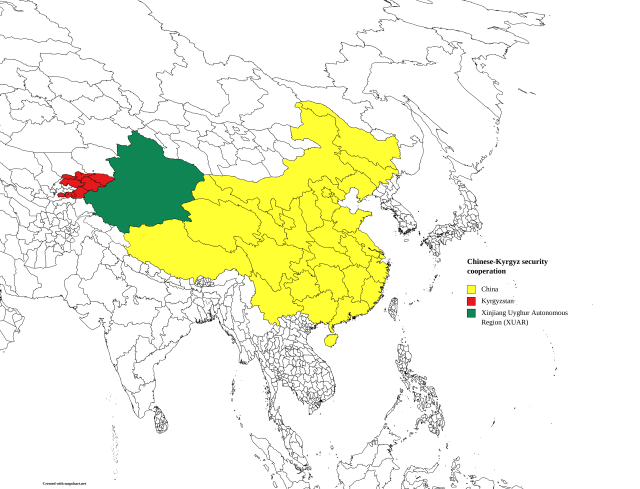
The Central Asian republic of Kyrgyzstan and China discussed implementing security cooperation to contrast terrorism, extremism, and separatism in the region and counter organised crime and illicit traffic. Since Kyrgyzstan play a decisive role in the Chinese Belt and Road Initiative, Beijing has economically supported the Kyrgyz economy and national development as the domestic security and stabilisation.
The Secretary of the Security Council of the Republic of Kyrgyzstan Marat Imankulov held talks with the special representative of the Ministry of Foreign Affairs for China’s external security, Cheng Guoping, via videoconference. The interlocutors discussed the possibilities of developing a bilateral partnership in the field of security. The parties paid particular attention to the problems of regional stability, including those related to the situation in Afghanistan, and evaluated the prospects for cooperation in the fight against terrorism, extremism and separatism.
Imankulov and Guoping also discussed further development of the interdepartmental interregional cooperation mechanism known as the “Dialogue on security issues between the Republic of Kyrgyzstan and the Xinjiang Uyghur Autonomous Region (XUAR) of the People’s Republic of China”. They agreed to develop security cooperation and expand relations.
Geopolitical scenario
- Kyrgyzstan is a fundamental asset in Beijing’s Belt and Road Initiative since this economic and transport route will cross the Kyrgyz territory, linking Urumqi’s city in XUAR with Central Asian cities such as Samarcanda (Uzbekistan) and Dushanbe (Tajikistan), crossing the Kyrgyz capital Bishkek. Kyrgyzstan’s security and stabilisation are mandatory for Beijing’s economic strategy in Central Asia and to support the Belt and Road Initiative.
- Security is fundamental at the Chinese-Kyrgyz borders considering that Kyrgyzstan shares its borders with Xinjiang, where Beijing has been fighting against Uyghur nationalism and local Islamic fundamentalism represented by the terrorist organisation Eastern Turkestan Islamic Movement.
- Kyrgyzstan is financially dependent on China because more than 40% of the Kyrgyz foreign debt (1.8 billion dollars) is owed to the Export-Import Bank of China due to Chinese investments in a series of infrastructure projects the last decade.
Why does this matter?
- Beijing needs a stable Kyrgyzstan for the Belt and Road Initiative. Therefore, we can predict Chinese diplomacy oriented to strengthening security cooperation with Kyrgyz authorities and at the same time increasing financial investments, which allows China to influence local politics and dynamics.
- On the one hand, Bishkek might exploit China for security issues and domestic stabilisation in this framework. Still, on the other hand, Kyrgyzstan needs to attract foreign investments from other regional and international actors to diversify its economic partners and decrease its financial dependence on China (UAE Investment Interests In Kyrgyzstan; Opportunità di investimento in Kirghizistan).
Author: Giuliano Bifolchi



